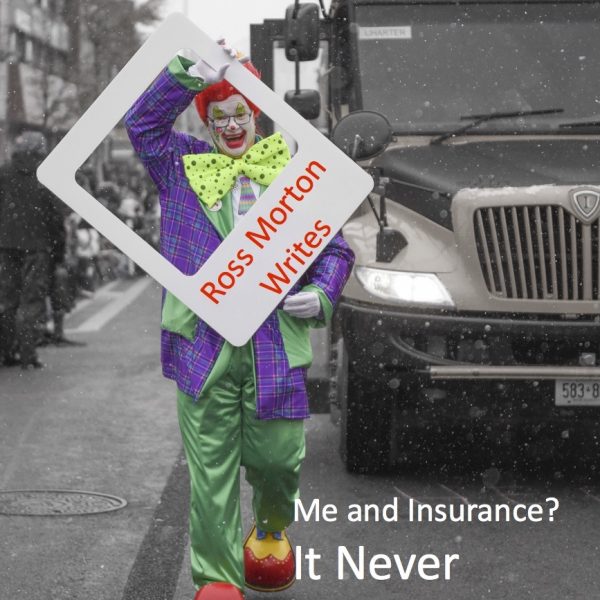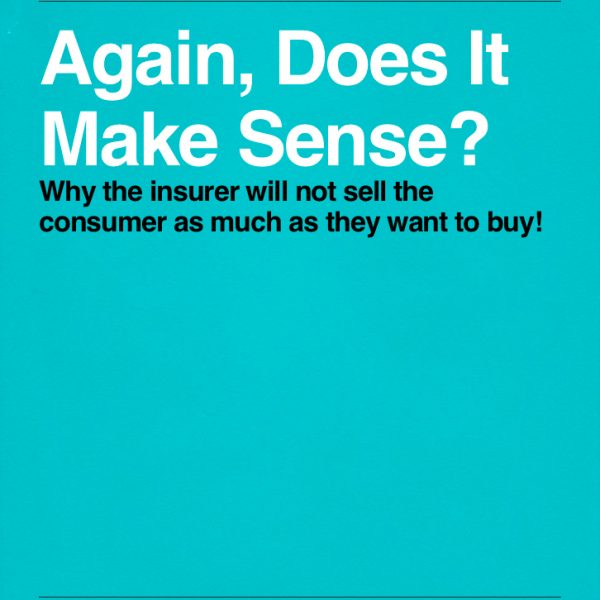It is so very hard to imagine that this article from Marketing Options was written 7 years ago. It is so relevant today. The world may have changed but the search for trust amongst the reinsurer insurer relationship continues. Reinsurance has become a commodity and culminates in far more extensive treaty arrangements. Yet each party must fundamentally trust the other for success long term.
Adding to the comments of 1997 must include the rip offs of trust by large corporations who are now before the courts where judgment is sought for what I like to call a misuse of trust. Liability insurance has sky rocketed to help bail out the poor insurers who dominate that market. The more prices go up the more the average consumer seems inclined to get the money back! The dubious claim becomes a game for some. An expensive game for all who end up paying. That is you and I.
Happily I am glad to report that as the number of people I have met grows so does the number I trust for their honesty and especially their forthrightness. In the day s of the dealmaker the pressure to forego forthrightness mounds and many succumb. In the end there are still fewer people than the number of digits that I possess who I no longer completely trust and it is usually the lack of forthrightness that does it.
Ross A. Morton
2004-06-02
Marketing Options
April 1997
Looking back at 27 years in the insurance business, I feel fortunate that it has been predominantly packed with lessons in trust. Trust extended. Trust rewarded. Trust rarely abused. If the latter did occur the person was often banished to some menial tasks or even another trade.
As a paper boy, I was entrusted numerous times to “come back later” with the change for a significantly large denomination like a $5 bill. I was so worried about this responsibility; it often seemed I was back on their doorstep with the correct changed before they closed the door.
When I entered the world of insurance, I quickly realized that customers put this faith, and even more, in the trust they showed their broker. The largess of the insurance proceeds, whether life or disability, depends on the intermediary who understands the customer and culminates that understanding in contracts for future performance of considerable financial proportions. Having been involved with numerous family deaths over the past three years, it has been heartening to work in an industry that has expediently delivered on contracts bought 35 years ago.
Six months out of university, I found myself working in reinsurance where the gentlemen who led the industry taught trust before all else. The handshake meant more than the written word and a commitment verbally conveyed was sacrosanct. An early claim that needed paying even before full treaty wording could be etched unto paper was all this neophyte needed to witness to appreciate the trust in a handshake. I saw trust further demonstrated by reinsurers who frequently accepted the rules of a ceding company’s underwriting department – rules often not written, for if the rules were not written, an agent could not challenge them, nor management manage them.
Reinsurers put a lot of faith in the company to sell the product to the agreed upon market, to obtain the assumed spread of risk, to manage the underwriting process to achieve mortality assumptions, to do everything possible to insure persistency (although term 100 brought out new meanings to managing persistency!) and to pay only the legitimate claims.
I only recollect one company who abused all of the foregoing. That California company of the 1970’s made better use of the telephone book to gather lists of names for the reinsurer than any other company on record. (This west coast company was the inventor of telemarketing without the expense of any telephone charges or commissions paid.)
This abuse of numerous reinsurers’ trust ran rampant until excessive greed caused the failure of one of the insurance industry’s greatest scams. I always felt blessed that the M&G Re, my company of origin, was not licensed in California at the time or I, and the band of M&G Re leaders, may have shared the other’s fate – massive reinsurance allowances paid on bogus business, which produced no corresponding premiums! In addition the claims for fictitious deaths swelled the transfer of cash from reinsurer to insurer.
This scam had nothing to do with the agent or broker. Quite the contrary, it was conceived, gesticulated and brought to fruition by the back room boys who succumbed to the greed of rapid growth. The closest comparison in Canada that did involve agent and broker was Project Lion, one of the more paltry scams some ill-begotten con artists dreamt up to take advantage of the industry’s front-end commission structure.
Is there less trust today? Yes, I believe we have moved towards a state that is far more litigious and unencumbered by historical rhetoric concerning the value of the handshake. Brokers find themselves in need of ever increasing errors and omission insurance as companies are not willing to blindly support the producer who may have erred. Companies seek to distance themselves from the actions that are taken by the broker who today represents numerous companies. With choice comes pain and extra costs. With choice come more perplexing contracts that can never hope to cover the unexpected or new conundrum.
Can trust be restored to the industry? “Never, “says my brain! If the goals or aspirations of so many are rooted in short term gain and not long term integrity, can the conclusion be any other? From a personal and speaking from the heart (a recent standard issue, I will have you note) perspective, I will not throw in the towel. That ever shrinking band of zealots that nurtured me will console me that I am not alone. We must just accept that there are truth sayers and then, there are others.
There seems to be a trend that moves even the staunchest of integrity’s supporters to throw in the towel. Mind you, I still assume the majority would gladly just wave the towel if they thought there was a chance of winning the trust game. Just like Toronto Maple Leaf fans, the majority painfully endure failure hoping for a second coming of the teams of the mid 1960s. Those who can remember working in our business, I believe, carry the same hope and optimism for a return to the trust that nurtured us.
The consumers trust their financial advisor to massage their financial picture, current and future, into a mosaic that is easily understood. The meaning being that the results of certain current actions will produce the consumers’ desired level of peace of mind. The broker, agent or purveyor of financial advice trusts the consumer to be honest and forthright (my interpretation of forthright is someone who volunteers all the salient facts versus the one who only volunteers the bare minimum and never elaborates on the facts). The poor agent in the Mullendore case who placed a huge case on an Oklahoma man in the 1970s must have wished there was more openness from his client. If he only knew the whole truth, he would be alive; poor, but happy. (before the second premium was paid, the client was shot dead. The agent was subsequently murdered in Alliston, Ontario and his assassin was eventually found dead in Montreal.)
As an underwriter at the time, I was just happy that my head office made a faster decision to commit its full retention to this case than I did. I was one of only a few underwriters who did not take a piece of that action and can so boast of it today. (However, when questioned I do volunteer the whole story and my underwriting prowess is less revered.)
Time has penetrated my very being, for when I started in this proud historical business of insurance I never looked over my shoulder. Rightly or wrongly, I trusted everyone I worked with. Today, as I slowly recover from the knives embedded in the back of psyche, I realize one either walks backward (the choice of many in the industry) or embraces the weight of a flak jacket. The flak jacket’s construction is one of legal paraphernalia and a strong caution in weighing the integrity of your partner, employer, customer or competitor.
Yet, I have learned that my trust that remains today is trust for an individual, maybe not so much a company. Cultures in companies change. One individual can do that and all others working for him are driven to follow. On the other hand, by actual count of business cards collected over the last three years of international travel, I have met 1,500 people. Of those, I would trust 1,499.
As my father said after World War II, “Only losers have to look over their shoulder 100% of the time.”

